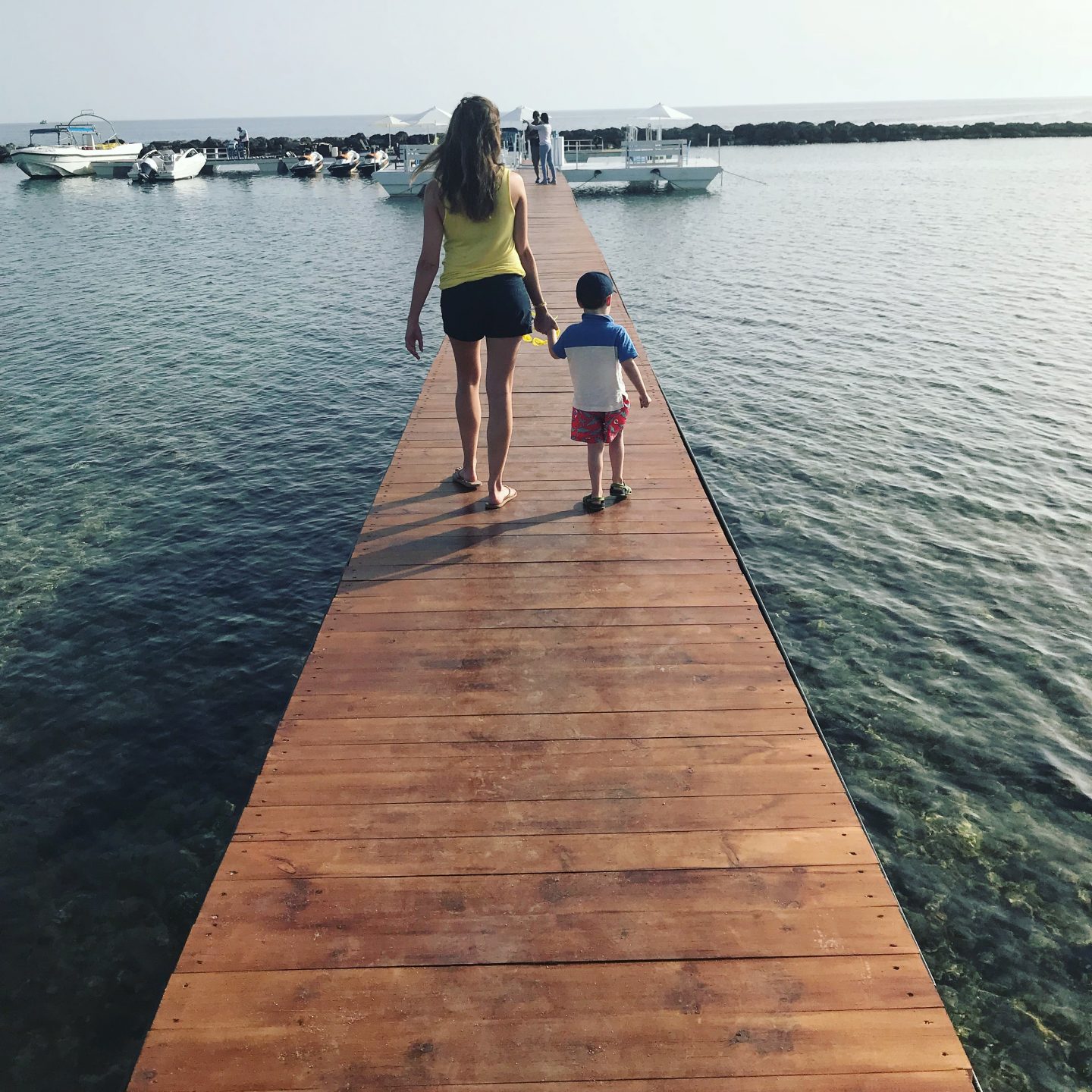Home » Mental Health » Contemplating pregnancy after PND

Since my announcement, I have had many a request for a blog post on pregnancy after PND. So here’s a blog article for those who’ve experienced post natal depression, and whilst their heart would like another, their head is filled with anxiety about feeling like ‘that’ again. It’s a long one, but it’s jam-packed with tips and insights.
My experience
When I first became pregnant, I had a history of depression, and a number of years of therapy and Psychotherapy training under my belt. I guess my medical records were a reflag for risk of postnatal depression as I was automatically allocated a Mental Health Midwife. She was sweet, but pregnancy and the early hazy months passed with little more than a hint of the baby blues and some overtired meltdowns. I coped, I socialised, I drank coffee at softplay and chatted sleep issues with buddies. ‘I’ve got this’, I thought. ‘I was made for this’. I was quickly discharged from the mental health oversight team.
I was pregnant by Oscar’s first birthday. I had an inkling as he blew his candles out on his homemade (slightly wonky) monkey cake, that next year he might be celebrating with a younger sibling. I was right.
My second pregnancy was different, not that it contributed to PND, but it wasn’t an easy start. Acute morning sickness made parenting hard as I warmed retch-inducing wheatabix for Oscar between rushing to the loo to be sick. I also had appendicitis which required emergency surgery and a truck load of drugs into my incubating body (cue the maternal guilt already kicking in).
Charlie came into the world in the very same pool as Oscar. Another long labour with a short and sharp ending. Textbook.
In a nutshell, we experienced undiagnosed silent reflux, tongue tie (twice…it can regrow, who knew?!), chronic sleep deprivation, horrendous feeding issues that I stubbornly battled through despite family begging me to stop (I felt it was the only single thing I could do for Charlie and I couldn’t bear to let it go). Meanwhile we were enduring a long-drawn out house move that wasn’t happening, a smashed up car, and other things I like to forget! All these things formed a perfect foundation upon which PND could thrive.
I rebuffed all offers for help and support, of cooked meals and the opportunity to nap. I’M FINE. I felt like a failure, and people offering innocent help gave me the incorrect impression that they too, thought I was failing. I felt my baby hated me, I hated me. I didn’t deserve him, or anything else good. I could barely string a sentence together, I stopped being able to hide my sore, red-eyes, and the terrified, weeping phone calls to my husband at work became a common occurrence. I went from thinking I could cope, to pretending I could cope, to believing I never could (here’s an article I wrote in my dark days)
On my 31st Birthday, I threw my hands up in surrender. You know what? I haven’t ‘got this’ at all. I went to my GP and wept as he asked about my bond with my baby.
I don’t need to go into vast detail of my post natal depression as this blog article is more about helping the future look a little more hopeful and less about the suffocating debilitation that post natal depression can grip you with. If you’re reading this article, it’s oh so likely you know that feeling, and for that, I give you the warmest and most compassionate hug. You made it. You might have dragged yourself through with faltering steps, but you made it mama.
In time, things changed. The sun slowly came through.
What helped me
There were three predominant factors to my recovery from PND:
1 – I forced myself to be open to a select few (namely a couple of close friends, my husband, my mum, my health visitor and my GP) about how I was feeling. ‘Forced’ seems like a strong word. But I really did have to battle against the fibres of my being, in order to open up. I knew something had to change. I was scared. Most of them, who’d seen me slowly unravel, weren’t at all surprised. In fact they seemed more relieved that the dropping of my weak façade meant that they would finally be able to step in, instead of watching helplessly from the sidelines. It wasn’t easy, but once I started talking, the words tumbled out in relief and slowly the shame ebbed away.
2- I started to accept that I am simply not created to do motherhood myself. Nobody is. Nor are you. I seemed to think I was an exception to the rule. I began to believe that seeking and accepting support of any form (be it practical, emotional, mental, physical) was not personal failure, but was in fact VITAL to good mental health. Letting friends be friends and family be family. Letting those who love me, love me in the way that I love them. Taking steps to learn to say ‘yes please’ instead of ‘I’m fine thanks’.
3 – I worked relentlessly at my cruel, bullying internal voice that was keeping me in that dark place like a millstone settling in the bottom of a lake. The voice that told me I was useless, hopeless, worthless. I did what I train others to do as a day-job! I started to challenge this voice with kinder and compassionate words that felt like lies at first, but slowly began to gain volume and power. These words are now stronger for me than my inner critic, and that, well that has changed everything. That has changed my life.
We moved house, Charlie’s reflux was medicated and improving, sleep was more plentiful, life became more do-able. I was in the swing of parenting two and working part-time in a job that I adore. So what next?
The ‘Shall we have another?’ question
As time went on, and as Charlie’s first birthday rolled around, the topic of trying for a third child kept cropping up. We’d always dreamed of having three kids. Tarun was one of three, I was one of three. Despite losing my sister to cancer before her seventh birthday, despite the fact I’ve lived through more of my life without her than with her, I still feel like one of three.
But this topic was loaded with abject fear. How would I ever cope? What if we had another reflux baby? What if the baby blues weren’t a fleeting tear filled couple of days, but months of deep dark blackness? I was scared of tipping my very new life balance that was filling me with purpose and contentment. For a long while, both my husband and I agreed that I was still healing from the trauma of that long, dark year, and that I needed more time.
I can’t say I ever got to a point where I proclaimed ‘Right. I’m READYYY. Let’s do this!’. And neither may you.
Charlie was nearing his second birthday, when I realised that the ground I’d covered had changed me. I was much better at seeking and accepting support, stronger at saying ‘yes please’ and ‘no thank you’ without fearing what people thought. I had become more naturally open, and my friendships more two-way streets (rather than me gladly offering support but refusing theirs). I had grown used to the concept of childcare and comfortable with utilising nursery. I realised that self-care habits had become an ingrained part of my life instead of a vicious internal battle. Little realisations like this, that the things I’d tried so hard to instil, had become a comfortable new normal for me, reassured me that whatever might lie ahead, I was more equipped with support than ever before.
So now, I’m pregnant. Nervousness and trepidation are woven through my excitement, but that is okay. That is to be expected.
This time my determination is more ‘I’m ready to do what I need to do to make it through’. Not in terms of expending every single ounce of my waning energy to battle through alone, but to call in the reinforcements, to go out and find the support I need, and to accept the support I have. It takes a village, and I am not a village no matter how capable I feel after a large coffee and a good night’s sleep.
My advice to you
So, here is my advice to you as you read these words with your own journey sitting heavily on your chest:
1 – Think about how you are now. How are you coping? How do you feel? Do you have residual or active depression that has not been properly addressed? Perhaps you need to invest in some personal therapy via your GP, or via the Find a Therapist page of the Counselling Directory. If you’re often feeling low, you deserve to address this sooner rather than later. And if you’ve experienced any level of trauma whatsoever, from what you’ve been through, please seek therapy in order to safely address this and enable you some freedom.
2 – Ask yourself how you feel and what you need. It’s likely that this has been a challenge for you. It is a challenge to any mum who’s focus is on the needs and feelings of their children, but if you’re going to be attending more closely to your emotional, practical, mental and physical needs, you need to ask yourself what they are. Get familiar with your needs, wants and feelings so that you can begin to act on them.
3 – Practice asking for and accepting help. Be it the offer of childcare for an hour so you can get some jobs done, or asking for a glass of water at your friend’s house when she’s forgotten to offer. Grow confident in stepping out to get your needs met. This is a hugely vital tool in the armour to fight PND. It’s not a comfortable task, but as your confidence increases and your needs are more likely met, you’ll find it easier I promise. This is so important.
4 – Carefully review your support network. Who’s there on standby, who’s standing in the wings? Who are the friends or family members that offer support? Does your hospital have a mental health midwifery service you can access? What did you struggle most with in your postnatal phase? What support might you have benefitted from had you been in a place to ask for and accept it? Have you found good online support? Is there a nice friendly network of baby groups and classes locally? What is around you already and what might you have to seek out?
5 – Take steps to speak with close friends or family members who you trust (if you aren’t already). Start letting them know how you feel in the little, day-to-day ways. The ups, the downs, the frustrations. If your usual response is to ‘keep calm and carry on’, this isn’t going to serve you well, just as it didn’t last time. Vulnerability is uncomfortable at first but entirely necessary for good mental health. Entirely necessary. Those first faltering words I spoke to a close friend, felt like shards in my throat, but now I speak more freely about my feelings. It gets easier as you get the kind and compassionate response that you’ve been denying yourself.
6 – Address your internal dialogue. If your internal voice is critical and strict, you need to really start trying to introduce a more compassionate dialogue over time. That critical and strict voice is the kind of cruel that will hit a girl when she’s down, and you certainly don’t need that. No matter what you think you deserve, you don’t deserve a little bully on your shoulder berating you and throwing petrol on the embers of mum guilt. You have to speak back to this voice. It might feel like a relentless argument at first, but imagine you were speaking those critical words to someone you loved. They need to be challenged because they are damaging. Retorting with a kind response (in the way you would to someone you love), feels unnatural and a little ridiculous, but never underestimate the power of doing this. In time, with work, the critical voice will be chipped away at and will slowly lose power. You need self-compassion. It’s a very powerful tool in the battle against PND.
7 – Consider practicalities and timing. There is rarely a ‘right time’, to try for another child but there can be ‘better times’. For example, Charlie has just turned two and is going to be starting our local nursery with Oscar next month. Therefore, I will be able to climb back into bed with the baby after doing the nursery drop off. I will be able to get cosy in my dressing gown and put on a box set, and recoup some energy. Last time I had a busy 19 month old and never once got to luxuriate on the sofa, but was instead rushing out to playgroups and feeding on plastic chairs in cold halls. What timing might be kind for your family and enable you best to get snippets of rest?
8 – Be kind to yourself. Take the pressure off. If the conversation of having another child fills you with fear, make a decision to leave that conversation on standby for a few months (we left it for six months), and instead, focus on implementing some of these points instead. Regardless of what decision you make and when, you’ll benefit from investing in these things.
8 – Talk this through with your partner. You need to be in this together. You need to be able to lean on them a little, and get used to leaning. Ideally your partner would form part of this support network, and keeping them in the loop about your true feelings and thoughts around another baby, better enables them to do this.
Final words
I hope this helps you. There is still so much more I could say. I feel a podcast coming on (I’ve never done one before so you’d have to bare with).
Whilst I feel a little anxious about experiencing PND again, I know that having learnt to be more open, both about how I’m feeling, and in accepting support, my next postnatal stage simply cannot be the same as my last one, and that I am confident of.
You’re worth investing in these things. Regardless of whether you believe that to be true.
Anna xx
Ps – Feel free to drop me a line to book a coaching session where we can chat about this in further depth. Or, you might benefit from my Nice Girls course where many of these qualities are worked upon.

Let’s keep in touch
My monthly newsletter full of thoughts, tips and recommendations to inspire and encourage you through parenthood and sometimes an discount for one of my courses.

Anna is a mum of three, and a Psychotherapist, Author and Speaker. She is a warm communicator with a passion for taking therapy out of the therapy room.
Her hope is that through words, spoken or written, people will experience light-bulb moments, learn about themselves and be able to find more freedom and enjoyment in life.

Let’s keep in touch
My monthly newsletter full of thoughts, tips and recommendations to inspire and encourage you through parenthood and sometimes an discount for one of my courses.
2 Responses
Hi Anna firstly, I LOVE following along on stories, you crack me up on the daily. Secondly, I could have written so much of this blog post (not literally!) it is exactly how I feel right now. I was in the depths of PND for a whole year before I told anyone. Looking back that seems ludicrous, that I could have walked that lonely road for that long without sharing what I was going through. I was terrified of looking like a failure and not having my shit together. Through therapy and a lot of self care I’m officially back to myself, although it’s taken 3 long years because of how bad it was. Anyway I just wanted to say a massive thank you for making me feel less alone in the ‘three or not to three’ dilemma and for talking so openly about PND. I honestly believe if I had it now it wouldn’t have gone on for so long because there is so much chat about it on social media and in the press and that’s thanks to people like you. So thank you and I can’t wait for your little ones insta debut. Xxx
Thank you so much for taking the time to write to me. I am so glad it helped, and am sorry that you suffered alone for so long. I know what you mean about appearing a failure, that kept me silent too. I’m glad you’re back to yourself now, and for sharing this with me xxxxx